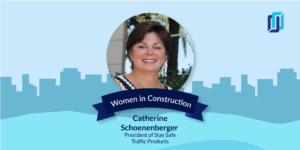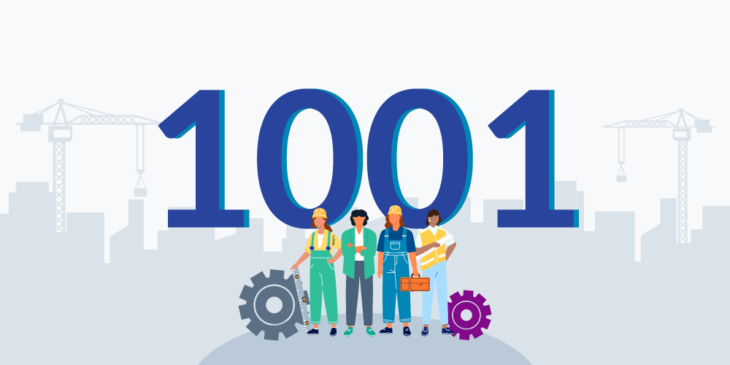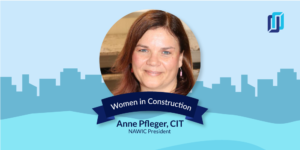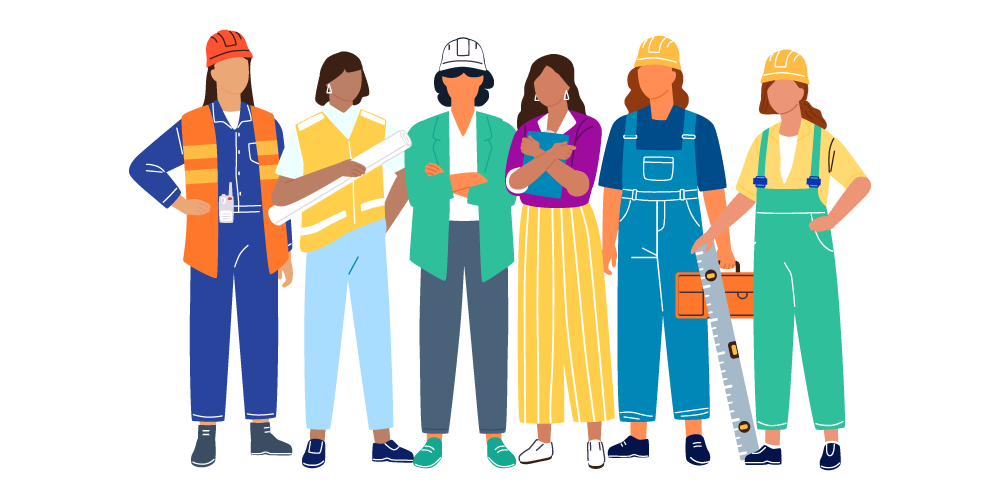
Catherine Schoenenberger is the owner and President of Stay Safe Traffic Products, Inc. in Westford, Massachusetts. Catherine has been a part of the construction industry her entire life — she grew up being raised by a family of equipment lessors and farm-owners.
This week, I spoke with Catherine about her professional journey in construction and the importance of networking and making connections with other amazing women in the industry.

See what 1,001 women in construction said about their jobs, their coworkers, and the state of the industry.
Dawn: How long have you been working in the construction industry?
Catherine: Since 1996. I’ve owned my own business since 2002.
Describe what you do. What is your day-to-day work like?
I run a small business: I’m in sales, I am customer service, I am a problem-solver. I am an advisor, creator, collaborator. I am a value-added representative.
“I love the autonomy of having my own business. I am grateful every day for my ‘commute’ to the office (literally the 12-steps down the stairs)!”
The products I sell include anything you drive by in your daily travels — traffic signs, street name signs, cones, drums, lights, all work zone equipment, including the PPE on the workers. It’s my job to keep my customers in compliance with federal, state, and local agencies, as well as safe from harm and/or legal action. This path has been a great education for me, and I am able to share with others that knowledge.
I love the autonomy of having my own business. I am grateful every day for my “commute” to the office (literally the 12-steps down the stairs)! When Covid shut us all down, the biggest effect it had on us was the quietness, there wasn’t any morning or afternoon commuters; not necessarily a bad thing.
“10 years from ‘now’ you’ll still be 10 years older, so where do you want to be — working for someone else or working for yourself?”
How did you get into construction, and where you are today?
I have been exposed to construction all my life. I grew up in a construction family and ironically, out of 11 children, I’m the first one to go to a four-year college and get a degree. I had no sights at all on being in the construction industry. My father sold heavy equipment and my parents owned a landscaping company and ran a farm. It was in 1996, when I answered a blind ad for a general manager. I had no idea what kind of business it was, but I had the confidence that I could run a business, and that’s what I did for the next six years.
On September 10, 2002, however, I took a leap of faith and began Stay Safe Traffic Products. Mentors and trusted persons in my life (my mother and husband first and foremost) gave me the added encouragement to go for it. My “aha-moment” was when someone pointed out to me, that in 10 years from “now” you’ll still be 10 years older, so where do you want to be — working for someone else or working for yourself? It was basically a rhetorical question.
Is there a person or group who has been a big source of support in your career?
My mother was absolutely number one, and definitely my life-partner, my husband, Keith. I joined great organizations, like NAWIC, which I’ve been a member of for 13 years.
I’ve never not been involved with any association I’ve belonged to. You get out of it what you put into it. And NAWIC is unique. I became President-Elect in a very non-conformist way. I didn’t follow the regular path that my predecessors did, but I had a confidence about it. I still know where NAWIC should be going. So, as much as they’ve been a support for me, I’ve been a support for them. I’ve seen what kind of a tool it really can be going forward.

“We’re all together in this”
Read the interview with Anne Pfleger, CIT, President of the National Association of Women in Construction (NAWIC).
Have you dealt with any harassment or discrimination in the workplace?
Truthfully, yeah. I don’t know when people are coming on to me and other people will recognize it long before I do. And I’ve had incidents throughout my many years being around all men, not recognizing that someone really is infatuated with me or is doing or saying something a little bit out of the norm. Someone else will catch it and say to something me and I’ll be like, “What?” But it wasn’t to the point of any kind of harm or it didn’t upset me to the point where I would’ve told my husband. He made me aware of one individual that I had no clue about. And he’s like, “No, he never kept his eyes off of you the whole entire time during that event.” And I’m like, “What are you talking about?”
“I am a woman, and I’m not going to ever hide or be sorry or apologetic about it.”
In certain situations, I have been abruptly reminded that I am a woman when I didn’t realize that gender was playing a role. I’ve gotten into many discussions with men about affirmative action programs, and they’re primarily white males.
When that happens, I take a pause and realize that I am a female, and I am a woman, and I’m not going to ever hide or be sorry or apologetic about it. I just chalk it up, saying, “Yep, you’re lucky to be in my presence.” And that’s how I look at it.
I know that there’s been physical harassment with women in our industry. Men are notorious and stereotyped for cat calling and stuff that’s just not necessary. I talked to a woman today in HR and she is constantly having to go onsite because of harassment issues. It can be man to woman, it can be woman to woman, it can be man to man. It’s the culture that needs to change.
I can pick and choose where I want to go. There are certain events that I know are drinking events, where the men get a little touchy-feely and I’ve been warned about it. But what has happened, and I’m thankful for this, is we’ve made it very clear to the leadership of these groups that if they don’t change what occurs on these weekends, they will not have 50% of their people going.
As the generations change, the younger guys are not plugging in like the older guys did. It’s not drinking and smoking and going to strip clubs or anything like that. They’re changing.
“People don’t care how much you know until they know how much you care.”
How has networking with other women in the industry helped you in your career?
I think it has afforded me a voice, a bigger voice. I don’t mean this any other way than I mean it, but I have been more of a mentor than a mentee. I have given more, and when you give you get, so that is my preference or prerequisite for anything. I have never gone into a situation to network and to build business, it’s happenstance that it’s happened.
I know that many years ago when I first started out in the industry back in 1997 or so, we went to an industry event where it was men and women, and the primary focus for my boss at the time was to get business started. As for me, I just wanted to build personal relationships, and in doing so, plan a sales strategy based on those relationships. People don’t care how much you know until they know how much you care. And that’s predicated on how I was brought up by my mom.
Because of the leadership role that I’ve had with NAWIC, I gained a lot of credibility. When you take on a national association and you become president, people are going, “Woah.” I’ve already been recognized by the American Public Works Association. They have about 30,000 members worldwide, and I was a national diversity committee chair. It had a lot to do with me being female — and because I can stand up and talk.
“You can’t learn less. It’s going to be uncomfortable, but you have to be uncomfortable at least a little bit in order to gain that experience.”
What advice would you give to other women who are just starting out in the industry?
Find other women, find people that look like you. Plugin and ask questions. You can’t learn less. It’s going to be uncomfortable, but you have to be uncomfortable at least a little bit in order to gain that experience.
If you get knocked down, get back up. Many years ago, I read Lean In by Sheryl Sandberg, and in that book, she talks about her friend who says a career path is a ladder — and it’s not. It’s more like the monkey bars, where it twists and turns and nobody goes in one direction — or very few people do. Many of us in construction, like myself, have at least a background in it. We grew up with a father or a mother or an aunt or an uncle or a brother that were somehow connected to construction, so we had a taste for it.
I have a very dear friend of mine, her daughter started out in the payroll department of her company, and she realized real quick what the tradeswomen are making.
She comes home and reports, “Mom, they make huge money.” Her mom says, “Jacqueline really had her eyes opened.” I’m like, “Well, tell her to pursue it.”
Now, this is a young woman who went to school to be an aesthetician and she is a beauty queen. But she recognized this is where I can really use my talents in a different way. So now, she’s doing cleanup on-site within the same company. She is one of two females that are out on-site to make sure that everything’s buttoned up the way it’s supposed to be. They’re doing the final inspections and she loves it.
Everything’s different. And she’s seeing the finished product too, that’s the other part of it. That makes me feel good. That kind of thing lets me know that you keep stepping in, you keep stepping up, and you may trip, you may do a lot of things, but don’t give up.
How do you think the construction industry will change in the next 10 years?
Technology is on our side. Things changed significantly when safety standards changed. That was the number one thing that changed construction, when we finally had some rules and regulations coming in. Technology is now at that point where it’s going to catapult us. And if women can harness that, if companies can harness that, if owners can harness that, then we will be allowed to work smarter and not just harder. I don’t want to ever think that I have to go up a ladder with a bundle of shingles on my back. Get a conveyor belt, set it up correctly and get it up there. I don’t want to have to think that I have to go up and inspect that roof when I can put a drone up in the air and get my drones license.
Further reading: The Future of Construction Payment is Technology-Enabled Collaboration
From my own standpoint, technology has made a huge difference in my business, because I can be anywhere, including right here. I can be anywhere, literally, and process an order or handle a situation.
The one exception being, I do a training module for road flaggers. In the initial session, I need to meet in person with these people. I cannot, I will not, set it up for Zoom. I know I’m allowed to, I just don’t want to. It’s not exactly an exciting subject, and if I’m not in the room spitting at them behind my mask I’m going to lose them. I can’t see the fundamentals of training like that and have it really make an impact, because the primary thing is not just to get a certificate, but to keep them safe.

More Women in Construction
Gloria Macias
Director of Credit and Collections, Action Gypsum Supply
Cindy Richter
President & CEO, Vanguard Fire Systems